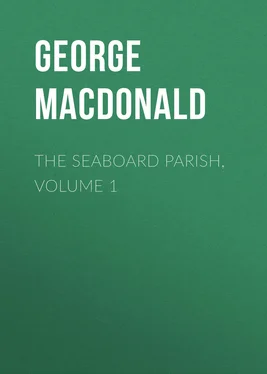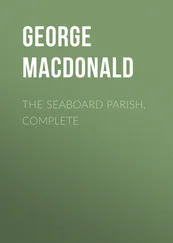George MacDonald - The Seaboard Parish, Volume 1
Здесь есть возможность читать онлайн «George MacDonald - The Seaboard Parish, Volume 1» — ознакомительный отрывок электронной книги совершенно бесплатно, а после прочтения отрывка купить полную версию. В некоторых случаях можно слушать аудио, скачать через торрент в формате fb2 и присутствует краткое содержание. Жанр: foreign_prose, foreign_religion, foreign_antique, на английском языке. Описание произведения, (предисловие) а так же отзывы посетителей доступны на портале библиотеки ЛибКат.
- Название:The Seaboard Parish, Volume 1
- Автор:
- Жанр:
- Год:неизвестен
- ISBN:нет данных
- Рейтинг книги:3 / 5. Голосов: 1
-
Избранное:Добавить в избранное
- Отзывы:
-
Ваша оценка:
- 60
- 1
- 2
- 3
- 4
- 5
The Seaboard Parish, Volume 1: краткое содержание, описание и аннотация
Предлагаем к чтению аннотацию, описание, краткое содержание или предисловие (зависит от того, что написал сам автор книги «The Seaboard Parish, Volume 1»). Если вы не нашли необходимую информацию о книге — напишите в комментариях, мы постараемся отыскать её.
The Seaboard Parish, Volume 1 — читать онлайн ознакомительный отрывок
Ниже представлен текст книги, разбитый по страницам. Система сохранения места последней прочитанной страницы, позволяет с удобством читать онлайн бесплатно книгу «The Seaboard Parish, Volume 1», без необходимости каждый раз заново искать на чём Вы остановились. Поставьте закладку, и сможете в любой момент перейти на страницу, на которой закончили чтение.
Интервал:
Закладка:
I am again seated in the little octagonal room, which I have made my study because I like it best. It is rather a shame, for my books cover over every foot of the old oak panelling. But they make the room all the pleasanter to the eye, and after I am gone, there is the old oak, none the worse, for anyone who prefers it to books.
I intend to use as the central portion of my present narrative the history of a year during part of which I took charge of a friend's parish, while my brother-in-law, Thomas Weir, who was and is still my curate, took the entire charge of Marshmallows. What led to this will soon appear. I will try to be minute enough in my narrative to make my story interesting, although it will cost me suffering to recall some of the incidents I have to narrate.
CHAPTER II.
CONSTANCE'S BIRTHDAY
Was it from observation of nature in its association with human nature, or from artistic feeling alone, that Shakspere so often represents Nature's mood as in harmony with the mood of the principal actors in his drama? I know I have so often found Nature's mood in harmony with my own, even when she had nothing to do with forming mine, that in looking back I have wondered at the fact. There may, however, be some self-deception about it. At all events, on the morning of my Constance's eighteenth birthday, a lovely October day with a golden east, clouds of golden foliage about the ways, and an air that seemed filled with the ether of an aurum potabile , there came yet an occasional blast of wind, which, without being absolutely cold, smelt of winter, and made one draw one's shoulders together with the sense of an unfriendly presence. I do not think Constance felt it at all, however, as she stood on the steps in her riding-habit, waiting till the horses made their appearance. It had somehow grown into a custom with us that each of the children, as his or her birthday came round, should be king or queen for that day, and, subject to the veto of father and mother, should have everything his or her own way. Let me say for them, however, that in the matter of choosing the dinner, which of course was included in the royal prerogative, I came to see that it was almost invariably the favourite dishes of others of the family that were chosen, and not those especially agreeable to the royal palate. Members of families where children have not been taught from their earliest years that the great privilege of possession is the right to bestow, may regard this as an improbable assertion; but others will know that it might well enough be true, even if I did not say that so it was. But there was always the choice of some individual treat, which was determined solely by the preference of the individual in authority. Constance had chosen "a long ride with papa."
I suppose a parent may sometimes be right when he speaks with admiration of his own children. The probability of his being correct is to be determined by the amount of capacity he has for admiring other people's children. However this may be in my own case, I venture to assert that Constance did look very lovely that morning. She was fresh as the young day: we were early people—breakfast and prayers were over, and it was nine o'clock as she stood on the steps and I approached her from the lawn.
"O, papa! isn't it jolly?" she said merrily.
"Very jolly indeed, my dear," I answered, delighted to hear the word from the lips of my gentle daughter. She very seldom used a slang word, and when she did, she used it like a lady. Shall I tell you what she was like? Ah! you could not see her as I saw her that morning if I did. I will, however, try to give you a general idea, just in order that you and I should not be picturing to ourselves two very different persons while I speak of her.
She was rather little, and so slight that she looked tall. I have often observed that the impression of height is an affair of proportion, and has nothing to do with feet and inches. She was rather fair in complexion, with her mother's blue eyes, and her mother's long dark wavy hair. She was generally playful, and took greater liberties with me than any of the others; only with her liberties, as with her slang, she knew instinctively when, where, and how much. For on the borders of her playfulness there seemed ever to hang a fringe of thoughtfulness, as if she felt that the present moment owed all its sparkle and brilliance to the eternal sunlight. And the appearance was not in the least a deceptive one. The eternal was not far from her—none the farther that she enjoyed life like a bird, that her laugh was merry, that her heart was careless, and that her voice rang through the house—a sweet soprano voice—singing snatches of songs (now a street tune she had caught from a London organ, now an air from Handel or Mozart), or that she would sometimes tease her elder sister about her solemn and anxious looks; for Wynnie, the eldest, had to suffer for her grandmother's sins against her daughter, and came into the world with a troubled little heart, that was soon compelled to flee for refuge to the rock that was higher than she. Ah! my Constance! But God was good to you and to us in you.
"Where shall we go, Connie?" I said, and the same moment the sound of the horses' hoofs reached us.
"Would it be too far to go to Addicehead?" she returned.
"It is a long ride," I answered.
"Too much for the pony?"
"O dear, no—not at all. I was thinking of you, not of the pony."
"I'm quite as able to ride as the pony is to carry me, papa. And I want to get something for Wynnie. Do let us go."
"Very well, my dear," I said, and raised her to the saddle—if I may say raised , for no bird ever hopped more lightly from one twig to another than she sprung from the ground on her pony's back.
In a moment I was beside her, and away we rode.
The shadows were still long, the dew still pearly on the spiders' webs, as we trotted out of our own grounds into a lane that led away towards the high road. Our horses were fresh and the air was exciting; so we turned from the hard road into the first suitable field, and had a gallop to begin with. Constance was a good horse-woman, for she had been used to the saddle longer than she could remember. She was now riding a tall well-bred pony, with plenty of life—rather too much, I sometimes thought, when I was out with Wynnie; but I never thought so when I was with Constance. Another field or two sufficiently quieted both animals—I did not want to have all our time taken up with their frolics—and then we began to talk.
"You are getting quite a woman now, Connie, my dear," I said.
"Quite an old grannie, papa," she answered.
"Old enough to think about what's coming next," I said gravely.
"O, papa! And you are always telling us that we must not think about the morrow, or even the next hour. But, then, that's in the pulpit," she added, with a sly look up at me from under the drooping feather of her pretty hat.
"You know very well what I mean, you puss," I answered. "And I don't say one thing in the pulpit and another out of it."
She was at my horse's shoulder with a bound, as if Spry, her pony, had been of one mind and one piece with her. She was afraid she had offended me. She looked up into mine with as anxious a face as ever I saw upon Wynnie.
"O, thank you, papa!" she said when I smiled. "I thought I had been rude. I didn't mean it, indeed I didn't. But I do wish you would make it a little plainer to me. I do think about things sometimes, though you would hardly believe it."
"What do you want made plainer, my child?" I asked.
"When we're to think, and when we're not to think," she answered.
I remember all of this conversation because of what came so soon after.
"If the known duty of to-morrow depends on the work of to-day," I answered, "if it cannot be done right except you think about it and lay your plans for it, then that thought is to-day's business, not to-morrow's."
Читать дальшеИнтервал:
Закладка:
Похожие книги на «The Seaboard Parish, Volume 1»
Представляем Вашему вниманию похожие книги на «The Seaboard Parish, Volume 1» списком для выбора. Мы отобрали схожую по названию и смыслу литературу в надежде предоставить читателям больше вариантов отыскать новые, интересные, ещё непрочитанные произведения.
Обсуждение, отзывы о книге «The Seaboard Parish, Volume 1» и просто собственные мнения читателей. Оставьте ваши комментарии, напишите, что Вы думаете о произведении, его смысле или главных героях. Укажите что конкретно понравилось, а что нет, и почему Вы так считаете.












